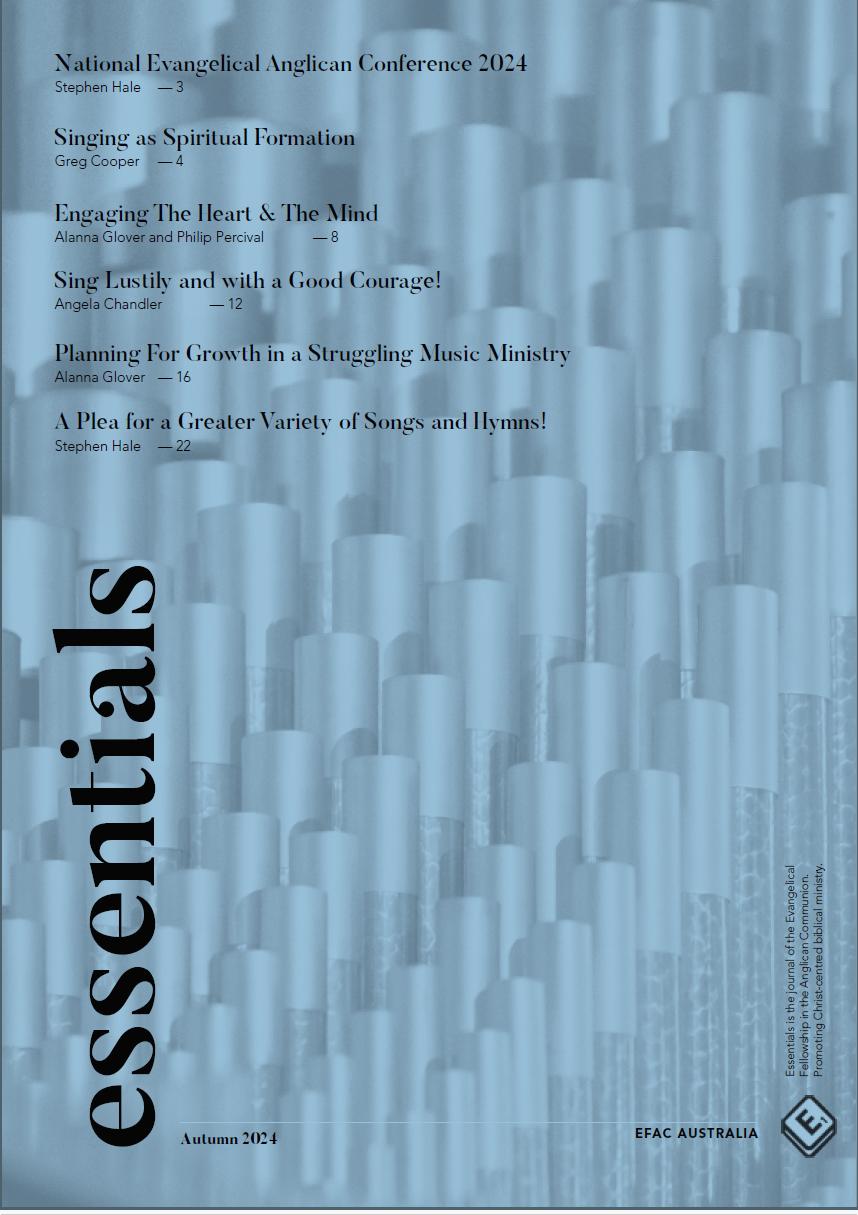Essentials
Bible Study: Ephesians 1:3–14
- Details
- Written by: Mark Simon
The main feature of the opening to Paul’s letter to the Ephesians is praise. Verses 3–14 are described by commentators as a thanksgiving, a eulogy, a hymn of praise or an extended blessing (a berakah in Hebrew, declaration of blessing, such as found in Psalm 103). The tone is exuberantly thankful and the content is theologically rich. As such, it represents a model for sung worship in the gathered church. In this study, we’ll explore the variety of ways in which Eph 1:3–14 informs and models how we might praise God in corporate song.
Observing the structure of the passage, we note the prominence given to each person of the Trinity. There is specific mention of “God our Father” (v. 2), “the God and Father” of Jesus (v. 3); Jesus/Jesus Christ/Christ (vv. 2, 3, 5, 6 ‘the Beloved One’, 10, 12); and the Holy Spirit (vv. 13–14). The qualities of God’s triune character particularly emphasized in this passage are: his sovereign election of a people who are made holy through redemption, adoption, and sealing with the Spirit (vv.5, 7, 13–14); God’s gracious initiative in this plan for salvation (vv. 4, 6, 7); and God’s love as the motivator of his actions (vv.4–5). Paul highlights in turn God the Father as sovereign over salvation history (vv. 4, 5, 10, 11), Christ as agent of redemption (v.7), and the Spirit as eschatological seal in this rich passage (vv.13–14). The trinitarian nature of Paul’s hymn of praise should encourage us to sing songs to Father, Son and Spirit – celebrating their comprehensive work that secures salvation, not neglecting any person of the Trinity as the object of our worship.
Singing as Spiritual Formation
- Details
- Written by: Greg Cooper
 Churches in Australia go to incredible lengths to sing together. Typically, churches do not have the resources to do music as they’d like. What’s more, views differ on the place of music in church life. Yet Sunday after Sunday, the church sings.
Churches in Australia go to incredible lengths to sing together. Typically, churches do not have the resources to do music as they’d like. What’s more, views differ on the place of music in church life. Yet Sunday after Sunday, the church sings.
Over the last 15 years, I’ve had the privilege of visiting churches throughout Australia to help in music ministry training. Almost all have been struggling to motivate their congregations to sing heartily, and to develop bands that lead the congregation well. Some church music teams are thriving – praise God! Yet mostly, churches are just getting by. I know of churches where faithful music teams are few in number and exhausted. I know of churches with no musicians – they sing along to YouTube videos in their services instead. I have served on staff as Music Pastor at three evangelical churches (2 in Sydney, 1 in Melbourne), each holding slightly different views on the place of singing and seeking to lovingly engage with congregational expectations of singing’s purpose and song choices. Perhaps these are familiar scenarios. Music ministry is complex.
Planning for growth in a struggling music ministry.
- Details
- Written by: Alanna Glover
 Wouldn’t it be nice if there was a magic formula that could ensure disaster-free Sundays? (Spoiler: there isn’t). If you’ve been in church ministry for any time at all, I’m sure you’ve experienced your fair share of Sunday service mishaps. (I’m convinced Lionel Richie wasn’t in parish ministry - there is nothing easy about Sunday mornings, sir!) This isn’t entirely surprising; most local churches in Australia are small, often minimally staffed, attended sporadically and run by average people who volunteer their time. If you do it for enough years and with enough people you’re bound to have moments where you stop and think, “will this ever get better?!” Church singing can be a particularly challenging exercise in this context. Music attracts lots of opinions, lots of emotions, and lots of logistical hurdles - it is hard to get it right! I’m sorry, I don’t have quick fixes for you, but I do have some helpful pointers for setting up a music ministry that enables your church to teach and admonish one another with the word of Christ in song.
Wouldn’t it be nice if there was a magic formula that could ensure disaster-free Sundays? (Spoiler: there isn’t). If you’ve been in church ministry for any time at all, I’m sure you’ve experienced your fair share of Sunday service mishaps. (I’m convinced Lionel Richie wasn’t in parish ministry - there is nothing easy about Sunday mornings, sir!) This isn’t entirely surprising; most local churches in Australia are small, often minimally staffed, attended sporadically and run by average people who volunteer their time. If you do it for enough years and with enough people you’re bound to have moments where you stop and think, “will this ever get better?!” Church singing can be a particularly challenging exercise in this context. Music attracts lots of opinions, lots of emotions, and lots of logistical hurdles - it is hard to get it right! I’m sorry, I don’t have quick fixes for you, but I do have some helpful pointers for setting up a music ministry that enables your church to teach and admonish one another with the word of Christ in song.
Read more: Planning for growth in a struggling music ministry.
National Evangelical Anglican Conference 2024
- Details
- Written by: Stephen Hale
National Evangelical Anglican Conference 2024
I’m writing to actively encourage you to come to the EFAC Australia Conference in late April this year in Sydney. We’ve billed it as Recharge, Refresh, Renew. We hope those who come will go home feeling inspired as well as refreshed in ministry. It’s been a tough few years for all who lead and many people are in need of encouragement and inspiration. Evangelicalism within the Anglican Church of Australia is continuing to extend and grow and there is much to be excited about, in the midst of the many challenges.
Our Bible Study leader is Rev Charlie Skrine, Rector of All Souls Langham Place. Charlie is a fine preacher and will bring the perspective of someone leading in a challenging context in the midst of the current turmoil in the Church of England. Archbishop Kanishka Raffel as President of EFAC will open the conference by sharing with us the challenges they are facing in his own Diocese.
You’ll discover what is distinctive about Gospel Leadership with Rev Adam Lowe; Jeri Sparks Jones will encourage you with Gospel Optimism for Young Adults; and you’ll learn about Wellness and Mental Health in our community and how we can respond from Valerie Ling. You will also be able to connect and learn from other people in your areas of ministry. There will be streams for everyone from rectors to youth workers, to key lay leaders and more.
If you want to be refreshed, recharged and renewed you can join us in Sydney on April 30th to May 2nd.
Stephen Hale
Chair EFAC Australia
Audio and video recordings from the conference can be found on the Events/National Conferences tab
Editorial Autumn 2024
- Details
- Written by: Mark Simon
“Sing to the Lord” is the repeated refrain of the Psalms, and one which shapes our corporate worship week by week. Christians delight to sing. Great congregational singing is a key ingredient for healthy, growing churches. Christian songs also shape our personal journeys of maturing in faith, obedience and service. Music ministry is thus a vital aspect of our gathered and dispersed church life, equipping and helping us as Jesus’ disciples to love God with all our heart, mind, soul and strength. In this edition of Essentials we focus on music ministry in our churches.
We hear from Greg Cooper on the manifold ways that singing contributes to spiritual formation. Alanna Glover and Philip Percival urge us to engage heart and mind as we sing, and not to pit emotions against truth, but respond to the gospel with our whole being. We have two practical ministry articles which dig into the nuts and bolts of music ministry. Angela Chandler analyses some trends and expectations in church music before elaborating on practical ways to engage and include a wider, more diverse, pool of people in congregational worship. Alanna Glover addresses the needs of smaller churches, where forming and sustaining a music team can be a constant struggle. She outlines principles for a church’s music ministry that will equip it for long-term growth. You’ll also find links to several resources Emu Music have developed to serve the local church’s music ministries: conferences, training, and a new searchable, curated ‘Hymnbook’ of contemporary and classic songs.
Continuing the focus on praising God through song, I present a Bible Study on Ephesians 1:3-14, exploring this joyous hymn of praise for the ways it informs and models the praise of God in corporate song. Rhys Bezzant brings us a review of A History of Contemporary Praise and Worship – a book that analyses the currents that flowed into the praise and worship music that dominates our churches today.
Stephen Hale offers his own plea for greater variety in the subject matter of congregational songs. You’ll also find Stephen’s invitation to come to the EFAC Australia Conference in April – it will be a wonderful time to ‘Recharge, Refresh, Renew.’
I trust that as you read you are encouraged to sing with renewed joy and thanks for God’s grace to us in all its forms.
MARK SIMON, EDITOR
Essentials - Autumn 2024
- Details
- Written by: Chris Porter
Essentials Autumn 2024 pdf (2MB)
Essentials Summer 2023 pdf (2MB)
Essentials Spring 2023 pdf (2MB)
Essentials Winter 2023 pdf (2MB)
Essentials Autumn 2023 pdf (2MB)
Essentials Summer 2022 pdf (8MB)
Essentials Spring 2022 pdf (4MB)
Essentials Winter 2022 pdf (4MB)
Essentials Autumn 2022 pdf (4MB)
Essentials Summer2021 pdf (3MB)
Essentials Spring 2021 pdf (3MB)
Essentials Winter 2021 pdf (3MB)
Essentials Summer 2020 pdf (3MB)
Essentials Spring 2020 pdf (1MB)
Essentials Winter 2020 pdf (1MB)
Essentials Autumn 2020 pdf (4MB)
Essentials Summer 2019 pdf (8MB)
Essentials Spring 2019 pdf (5MB)
Essentials Winter 2019 pdf (5MB)
Essentials Autumn 2019 pdf (5MB)
Essentials Summer 2018 pdf (5MB)
Essentials Spring 2018 pdf (5MB)
Essentials Winter 2018 pdf (5MB)
Essentials Autumn 2018 pdf (5MB)
Essentials 2024
- Details
- Written by: Chris Appleby
To look through the collection, see the article list on the left.
Publishing of Essentials is made possible by a paid membership so if you're not currently a paid-up member/subscriber we encourage you to become one so we can continue to fund this very worthwhile journal. Our Membership form is here.

